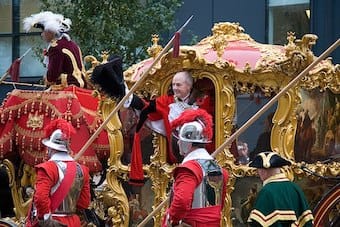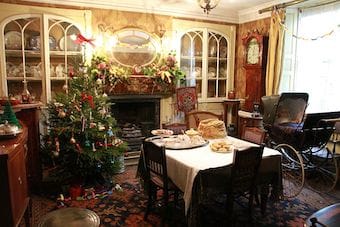John Stuttard, Lord Mayor of London, in full regalia for the Lord Mayor’s Show in November 2006. Traditionally, magistrates were appointed at Michaelmas, and the Lord Mayor of London (the ancient ceremonial office, not the modern political Mayor of London) is elected at or near Michaelmas, and the Autumn term for Universities and the Bar is named after this day.
A CHURCH named the Michalion near Constantinople was already a popular place of healings and pilgrimage in the days of fifth-century historian Sozomen, who testified to one miracle himself: a fellow barrister named Aquiline was cured of a life-threatening fever by a salve of honey, wine and pepper revealed to him during a vision of Michael inside the Michalion.*
At first, each local church had its own date for Michaelmas, but in time the East settled on November 8th, the patronal day of a late fourth-century church dedicated to St Michael in Constantinople itself; in the West it was September 29th, after a now lost Basilica of the Angels in sixth-century Rome.
Goose was the traditional Michaelmas fare in England, while in Scotland, scone-like cakes called Michaelmas struan were baked on Michaelmas Eve using grains of all kinds from the year’s harvest. After a blessing at the communion service next morning, they were given to the poor in memory of the absent or the departed.*
The doctors were horrified, because the spicy nature of the concoction (externally applied as a foot-bath) was according to their system totally wrong for the bilious nature of his complaint. As their medicines had all but killed him already, the learned Counsel was not disposed to heed their advice and ignore St Michael’s. Aquiline was a guest of Sozomen’s when he was writing this part of his history, so the authority could not be better.
The association of St Michael the Archangel with healing and the departed is reflected in St Bede’s history of the English Church and people. He tells us that John of Beverley (?-721) healed a dumb man while staying at a cottage by a graveyard dedicated to the Archangel Michael; and Michael appeared to the terminally ill Wilfrid of Hexham and York, to announce a four year extension on his earthly life courtesy of the Virgin Mary. See our stories The Bishop and the Chatterbox and St Wilfrid’s Debt.
Précis
Michael’s association with healing goes back at least to fifth-century Constantinople, as does the Eastern date for Michaelmas, November 8th. In England, enduring Michaelmas customs include serving goose on the day, and in Scotland, cakes blessed in church and distributed to the poor in memory of the those who are far away, or who have died. (56 / 60 words)
Michael’s association with healing goes back at least to fifth-century Constantinople, as does the Eastern date for Michaelmas, November 8th. In England, enduring Michaelmas customs include serving goose on the day, and in Scotland, cakes blessed in church and distributed to the poor in memory of the those who are far away, or who have died.
Variations: 1.increase the length of this precis to exactly 60 words. 2.reduce the length of this precis to exactly 50 words. 3.introduce one of the following words into the precis: although, because, besides, if, just, not, ought, whether.
Archive
Word Games
Sevens Based on this passage
Suggest answers to this question. See if you can limit one answer to exactly seven words.
Variations: 1.expand your answer to exactly fourteen words. 2.expand your answer further, to exactly twenty-one words. 3.include one of the following words in your answer: if, but, despite, because, (al)though, unless.
Spinners Find in Think and Speak
For each group of words, compose a sentence that uses all three. You can use any form of the word: for example, cat → cats, go → went, or quick → quickly, though neigh → neighbour is stretching it a bit.
This exercise uses words found in the accompanying passage.
1 Local. Miracle. Wee.
2 Eat. Name. Service.
3 Its. Own. Use.
Variations: 1. include direct and indirect speech 2. include one or more of these words: although, because, despite, either/or, if, unless, until, when, whether, which, who 3. use negatives (not, isn’t, neither/nor, never, nobody etc.)
Verb and Noun Find in Think and Speak
Many words can serve as noun or verb depending on context: see if you can prove this with the examples below. Nouns go well with words such as the/a, or his/her; verbs go well after I/you/he etc..
This exercise uses words found in the accompanying passage.
1 Stand. 2 Call. 3 Rent. 4 Reveal. 5 Land. 6 Make. 7 Bar. 8 Quarter. 9 Date.
Variations: 1.if possible, use your noun in the plural, e.g. cat → cats. 2.use your verb in a past form, e.g. go → went. 3.use your noun in a sentence with one of these words: any, enough, fewer, less, no, some.
Add Vowels Find in Think and Speak
Make words by adding vowels to each group of consonants below. You may add as many vowels as you like before, between or after the consonants, but you may not add any consonants or change the order of those you have been given. See if you can beat our target of common words.
rsd (6+2)
aroused. erased. raised. reside. residue. roused.
arsed. reused.
Post Box : Help Available
You are welcome to share your creativity with me, or ask for help with any of the exercises on Clay Lane. Write to me at this address:
See more at Post Box.
If you like what I’m doing here on Clay Lane, from time to time you could buy me a coffee.
Buy Me a Coffee is a crowdfunding website, used by over a million people. It is designed to help content creators like me make a living from their work. ‘Buy Me a Coffee’ prides itself on its security, and there is no need to register.
Related Posts
In the family of Samuel Pepys, the Feast of the Epiphany was kept with music, cake and quaint traditions.
Picture: © James Petts, Wikimedia Commons. Licence: CC BY-SA 2.0.. Source.
Posted October 5 2023
Mothering Sunday is a peculiarly British celebration of Christian faith, close family and responsible freedom.
Picture: Via Wikimedia Commons. Licence: Public domain.. Source.
Posted March 26 2017
Cromwell’s killjoys almost silenced the English Christmas, but thanks to a royal family tradition the message is still being proclaimed.
Picture: © milo bostock, Wikimedia Commons. Licence: CC-BY-SA 2.0.. Source.
Posted December 5 2015





